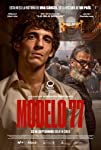Eye For Film >> Movies >> Prison 77 (2022) Film Review
Prison 77
Reviewed by: Jennie Kermode

Tidying up after fascism is never easy. Whilst people like to imagine everything going back to normal as soon as the pressure is off, that requires an exhausting amount of organisation and hard work, plus there’s the problem that those who got into positions of authority during the previous regime often remain in place and continue to try to run things in accordance with their own preferences, regardless of the word from the top. This problem is particularly acute in prisons, which tend to suffer from political neglect at the best of times. It’s one thing to take action over people who have been imprisoned for obvious political reasons, but a lot more will is needed to deal with a system which is simply overwhelmed due to overzealous policing and a backlog of trials.
Prison 77 spans more than half a decade, beginning in 1976, three years after the fall of Franco. It follows Manuel (Miguel Herrán), a young accountant in an expensive suit who is hopelessly out of his depth when abruptly placed behind bars. Perhaps things could have been worse – he’s good looking, but the overcrowding means that there’s no shortage of younger, prettier prisoners, one of whom he meets in holding, realising with horror what’s likely to happen to him. Director Alberto Rodriguez does not dwell on this or other aspects of violence between prisoners, however, showing us only what’s essential to the story. He is far more interested in the abuses doled out by the guards.
Manuel is educated but not always smart. As such, he immediately responds to such abuse with a formal complaint, and gets more of it. When in isolation, however, he receives a note from another prisoner, the first indication that there is a union of sorts in development within the prison. It is the first step in a process of organised resistance which will, some years later, make national news, as the inmates work together to campaign for reform.
Central to Manuel’s journey is an opportunity which comes by chance when he is placed in a cell with the decades-older Pino (veteran actor Javier Gutiérrez), a man who just wants a quiet life but whose fondness for loud shirts and success at running a science fiction library for fellow inmates mark him out as someone not easily intimidated. Whereas most prison films focus on strife, it’s the gradually developing friendship and respect between the two which forms the bedrock of the film and changes both their destinies.
The ugliness of the system doesn’t just lie in violence. Manuel has no visitors except for his girlfriend’s sister, Lucia (Catalina Sopelana), who, eventually acknowledging that she has a crush on him, becomes his only real source of information from outside, and informs him that he could have to wait up to four years before he even gets a trial. His lawyer, weighed down with other cases, has little time for him. other prisoners have still worse injustices to report. Many of them are in there for trivial offences. Outside the window, a neon sign can be seen, bearing the legend ‘salé a color’ – ‘jump to colour’. Inside, it’s hard to get a newspaper, let alone access to TV.
Shot in the real life Modesto prison, which Rodriguez waited for years to access, the film is based on real events, including the AmnistÍa campaign which gained momentum following deaths amongst the inmates. There are thriller elements here as prisoners take what opportunities they can get to produce leaflets about their plight and try to get them to people on the outside. Punishments for those who are caught are severe – potentially fatal. There are also lighter moments, however, as when a chicken wearing a slogan gets into the yard and the guards run around trying to catch it. Little things bring relief: a scrap of tinsel caught against a grille, a little bird determined to find food in spite of icy ground.
There will be obvious comparisons made between Prison 77, which screened at the 2023 Glasgow Film Festival, and The Shawshank Redemption. This, however, is a different beast. Not only is it much more realistic about many aspects of prison life (aided by gravity of the location), but it’s unwilling to write off the prisoners’ treatment as the work of a few abusive individuals – it openly condemns the larger system which allowed it to happen. Herrán and Gutiérrez are both excellent and keep the film rooted in character so that its politics feels real and urgent rather than coming across as an add-on message. The result is a reminder of the vulnerability of prisoners everywhere, in every era – and it’s also a thrilling watch.
Reviewed on: 03 Mar 2023
















